Australian singer-songwriter, Robert Forster, should really need no introduction. Best known as the co-founder of the seminal indie rock band The Go-Betweens, Brisbane born Forster met Grant McLennan while at the University of Queensland in 1976 and formed the band in 1978. They quickly gained a reputation for their songwriting prowess and their fetching brand of melodic indie pop. Releasing six albums before disbanding in 1989, Forster embarked on a solo career, issuing debut solo album ‘Danger in the Past’, in 1990. After a string of well-received solo LPs throughout the 1990s and 2000s, including ‘Calling from a Country Phone’ (1993), ‘I Had a New York Girlfriend’ (1994), and ‘Warm Nights’ (1996), Forster reunited with McLennan to reform The Go-Betweens in 2000. The group’s second era produced three more albums: ‘The Friends of Rachel Worth’ (2000), ‘Bright Yellow Bright Orange’ (2003), and 2005’s ‘Oceans Apart’. Sadly, the reunion came to an abrupt end with the untimely death of McLennan in 2006. Forster's solo career continued after the demise of The Go-Betweens with 2008’s ‘The Evangelist’, featuring tracks he’d co-written with McLennan before his death. Other notable albums include ‘Songs to Play’ (2015), ‘Inferno’ (2019), and ‘The Candle and the Flame’ (2023). On the cusp of the release of his ninth studio album, ‘Strawberries’, Pennyblack spoke to one of Australia’s most enduring and prolific song-writing talents. PB: Hi Robert. Hope you are well and thank you for agreeing to speak to Pennyblack Music. I’ve listened to the new album ‘Strawberries’ and I’m really enjoying it, but let's start the interview with talking about 2023's ‘Candle and the Flame’. You went on record saying that it was quite a personal record and it was a bit of a family affair, due to you having a bit of a tough time around the time of recording it. I got the impression that you put your all into it and it took quite a lot out of you. RJ: It did and it was a very unusual album because my wife [Karin Bäumler] had severe health issues. We could only go into the studio about one day a month and we could only rehearse here in the house. It was very much an unusual record to make and it was a very charged and emotional time. But making the record really helped as it was a place that we could go to and just talk about things. You know, a source of conversation. It meant we had something to work on, which, at that time, was really a beautiful thing. PB: I guess it put you into a very different position and challenged you as an artist? RF: Yes, it did because it was just preparing for weeks for one day in the studio, because that's all that Karin could do, so I produced a very unusual album. A lot of it was recorded live. It was recorded over a period of months as well, so there'd be one day, and then no recording for about three or four weeks. It was the exact opposite of the way that most records are made. Karin was coming through a lot of therapies and a big operation. It sounds like a crazy thing to do but she was thriving. Our friends and family were on the record as well. So, it was just a really good thing to do and so it all worked out well. PB: With the new record, you've gone to Sweden to record it. Did all of what had gone before influence you to do something different this time around and to want to do something a bit more in the ‘third person’? RJ: It did. Medically, we were through all that, and Karin stood on the other side, so I wanted to make a record with a lot more colours to it, musically. But I took some things from ‘The Candle and the Flame’. Virtually all the vocals were recorded live. There's a couple of tracks where I'm playing with other musicians, and I kept the vocals and I kept my rhythm guitar. And I took that straight into ‘Strawberries’, because I knew that we had just six days with the guys in the studio. There wasn't time for me to spend a day on vocals. It just wasn’t possible. PB: You very quickly get into diminishing returns when you are doing vocal takes over and over again, don’t you? RF: Yeah, you do. You're exactly right. I don't think anyone really notices if you are fucking up. I don't think anyone goes ‘Oh, that second line of the second verse. He's not singing that as well’. I think people get into a vocal and follow it, unless there's disasters in it. Most of the vocals on 50s and 60s records were all done live or in one take or something like that and they all sound great, so I always knew it could be done and the ‘Candle and the Flame’ gave me the confidence to do it. PB: I think ‘Strawberries’ sounds really fantastic. You make reference to the songs coming quite naturally and I think that really comes across. They just flow really naturally. RF: We were in a room and we had six days. They're very good musicians and we’d rehearsed for a week. It was all quite compact, but I didn't want to do it in bits and pieces. I went to Stockholm with the idea of being there for four weeks and walking in without an album and walking out with an album done. We did the rehearsals, the recording, and the mixing, all within four weeks, which I think is pretty much an ideal time for me. PB: In your press notes I think you said there was no theme, but I think the human condition and human feelings run through all of the songs. RF: Yeah, you're right. I had these eight songs for the album and felt I could play them all to someone with acoustic guitar and that they all just sort of worked together, more than probably any other album I've done. And there was a flow to them. I just sort of felt like these eight songs were just welded together. They're like a song ‘cycle’. I've never felt that about any album I've ever made, so I felt I was ready to make the record. PB: In the past you’ve alternated between doing an album at home in Australia, in Brisbane, then going abroad, travelling to the likes of Berlin and London. Any reason why you chose Sweden this time? Was that down to your friend Peter Moren? RJ: Yeah, he'd put a band together that I’d toured with in Scandinavia and the band were fantastic, and that’s basically the core band on the album. Peter on guitar, a guy called Jonas [Thorell] on bass and Magnus [Olsson] on drums, and they were the three people that I played with in 2017. We did five shows in Scandinavia, and that was so great. There was such a chemistry between us. They played the songs so beautifully that I think we all felt we had to do something more for it. PB: So, you weren’t really going there ‘blind’ and taking a risk. RF: No, we played together, and I passed through Stockholm in 2023, and we did a show together again, and it was the same feeling: ‘This is just incredible. We have to make an album’. So, I came back the following year and I started to talk to them and I was emailing Peter and he was saying ‘I can get you a studio. I've got a rehearsal room’, so he sort of put it all together. He's a producer, so I walked in knowing what everything was. And that’s great, because it was a gamble going from one side of the world to the other to make an album, but it wasn't like I had to put the musicians together and find a studio. PB: If you've only got a month, it focuses the mind. You've really got to make sure that everything's in place so you're not a month in and you're not finished. RF: Yeah, but it was a gamble in terms of if we'd have messed up one song and there’d been a big stumble. Or if the studio didn't work out. But everything worked out and that was the amazing thing. We didn't have a hitch, and we just went all the way through, which is quite incredible, because there's a lot of parts to it; mixing, recording, rehearsing. Something can go wrong, where you just don't crack a song, or something goes off in the wrong direction, and you can’t get it back again. All of those sorts of things can happen, but it didn't, which was really beautiful. PB: Let's, let's get down to the individual tracks themselves. I really love the opening cut ‘Tell It Back To Me’. I like the harmonica, the humour, the shameless rhyming of French with bench, because some people tend to try and be too clever, don't they? And I wondered if you've ever fallen in love with someone who you know, from the outset, that it's not going to work? RF: That's a good question. No, not really. I couldn't start if I thought that I couldn't sort of commit to that sort of arrangement. PB: So that was very much in the third person, that song? RF: Yeah, definitely. It has nothing to do with me, but just even writing a story, a part of you is in that story. There are choices you make about the story itself that just have your hand in it. Even though the story is happening in other places, and people have jobs that you've never had, and all these kinds of things. It's part invention and part fact. PB: ‘Good To Cry’ is great, I was getting a real Lou Reed/Velvet Underground vibe from that and the rest of the album as a whole to be honest. RF: Yeah, it just came to me quickly and is a rock-pop song. Two minutes twenty seconds, and I like writing those kind of songs. I like to write a variety of songs, I don't like everything too big, or I don't like everything to be too small. I like a mixture, and so that song, although it's not one of the centrepieces of the album, it plays a part. And it's just got a flavour that none of the other songs have got. PB: But the next track, ‘Breakfast On The Train’, does play centre-stage, doesn't it? When I saw it clocking in at the post seven-minute mark, I thought “God, this is going to go on!” But it didn't, it just flew by. I think that was because of the story and as the listener, you wanted to hear the next verse and what was going to happen. I thought it was brilliant. RF: I really love the melody of the song. And I knew that it had to go on for a while and I sort of knew that it had to be a story. When I tour in Europe and when I'm playing as a solo artist, I travel by trains. I find that the best way to travel and also the most economical. I enjoy having a train trip during the day between shows. The lyric came from the idea of why would you have breakfast on a train or in the dining car? And just thinking that you'd have lunch on the train, you would have afternoon tea on the train, but why would you have breakfast on a train? And so that got my mind thinking of the story. PB: It's interesting because when you're on the train, you see the world from a completely different point-of-view from when you're driving, don't you? You see stuff that you don't normally see. RF: Yeah, I enjoy it. In a car on a highway, going down the M3 or the M1, you're on tour and you're boxed in this car and there's traffic everywhere. I find that's not the ideal set up to play a show. I find with being on a train I don't have to worry about cars overtaking me or being in three lanes of traffic or the wrong side of the road. Or someone takes the wrong turn off. You're trying to go up to Sheffield and suddenly that sort of thing can happen. That's another layer of stress, which you don't need as a performer really, between shows. You're thinking about the night’s show and you're wanting to just sit there with a book or look out the window. That's the ideal thing for me. PB: And then we're on to ‘Strawberries’, which is a duet with your wife, Karin. How is she doing? RF: She's fine, thank you. PB: That’s great to hear. I mentioned The Velvet Underground earlier, and I got a bit of ‘I'm Sticking With You’ vibe with the album’s title track. Maybe because it's a duet. RF: Yeah. I've never written a song like that before either. There are few songs like that. With ‘Breakfast On The Train’ I’d never written anything like that before. And ‘Strawberries’, I'd never written anything like that either. It's quite musical for me. PB: It's great. It should be a hit. RF: Please, can you make it a hit on the British pop scene? PB: [Laughs] I'll try. I will do my best for you, Robert. RF: Okay, thank you. I appreciate that. I've always liked pop music. I grew up on AM radio, pop radio, so that's always been a part of me. So, I'm glad that I could write a song like this. PB: And it's great when a track comes out of fairly mundane, ordinary circumstances, isn't it? RF: It is. I'd written the melody, and I was just eating strawberries. You know, it has to be very real for me. I don't have a great imagination. I have to be on the train to write a train song. I have to be eating strawberries for the line ‘Someone ate all the strawberries, it must have been me’, to come to me. Things have to be very much in front of me or around me and that's where I find function. PB: Then we’re on to ‘Such a Shame’. What a beautiful song. For me, that's the album's most melancholic and introspective moment. RF: Thank you. When I wrote that melody, I was very proud and surprised. I'm just happy that I'm still writing songs of some quality, because I thought I might have burned out by now, but ‘Such a Shame’ is proof that I haven’t. That’s very encouraging. PB: And that’s a big line at the end: ‘No one who's met me yet has seen me my best.’ RF: It is a big line, but it's what that person in the song is thinking. Obviously, it's a musician and a singer-songwriter who's touring. So, these are all things in common with me, but the person, when I was writing the song, I was thinking this is someone in their mid to late 20s, who's maybe been hyped up and who's on a big label and maybe done one or two albums. They’ve done a lot of touring and just maybe at the end of all of that, is just looking back on the worth of what they're going to do next, and they want to get out of town and just sort of think about their next steps. They are a bit shell-shocked from what's happened. That type of person. PB: I really like that, I think it is my second favourite song on the album. So, on to the final track, ‘Diamonds’, and wow, what a closer. That was the last track that you wrote for the album wasn’t it? RF: That was like ‘Such a Shame or ‘Breakfast On The Train’. I wrote it, and I knew it was a big song, and it was the sort of territory that I hadn't really done before. That's another song that just surprised me in that I could write something like that. I'm really happy that it comes last because sonically there's a lot happening on that track. It’s a bit of a surprise that it suddenly goes into this heaviness and that sort of feeling that isn’t anywhere else on the record. I quite like that, holding that off to the end. And it seems like a perfect way to finish the record too. PB: It's hard to imagine what you would put after that anyway, isn't it? RF: Yeah, you're exactly right. That's it. That means that it must be the last song. It was meant to be. PB: I found that the album went past really quickly and I was left wanting to hear more, so I just put it back on again. RF: Right, that's what I want. It's also the first eight-song album I've made. I've been wanting to make an eight-song record for quite a while. I wrote that last song, and there's a couple of other long songs, you know, like ‘Breakfast On The Train’ that is eight minutes and the longest song I've ever written. And there was a couple of other longer songs, which meant I could fulfil this dream. PB: And it also fits perfectly on vinyl, which is making a massive comeback now. RF: It is. I was thinking of that, too. There's a symmetry to it and it just felt exactly right. PB: And the right song at the end of side one and the right song at the start of side two, and all sort of stuff like that. RF: Yeah, I still think in those terms. I still think that's the way an album breaks down for me and I don't think I'll ever think otherwise, unless I write a completely different album. PB: So that’s gone through the tracks on the album. In terms of the title of the album, did ‘Strawberries’ present itself as an obvious title? RF: In terms of the title track, ‘Strawberries’, I didn't know it was going to be the single, I just like that it was a bit enigmatic. The album was, for a short time, going to be called ‘Strawberries and Other Stories’ because I was pushing that story's idea, but then I just thought it's just a little bit too wordy, and I thought that people would pick that up anyway. And I like the quality of just the one word. PB: I thought that ‘Diamonds and Strawberries’ would also make a good title too. RF: Well, that was an idea that was also a suggestion floating around. PB: That said, I think ‘Strawberries’ works well and it draws you in. And then, obviously, you've got the song for the context. RF: For me, it just fitted the record. PB: This is your ninth solo studio album and in the past, you wrote a lot in The Go-Betweens with Grant McClellan. Do you write differently now to when you were in the band? RF: I hope so. The process is the same, but they were songs written when I was in my 20s and early 30s. That was the first round of The Go-Betweens, and then for the second round, I was in my early-to-mid-40s. So they were particular periods of my life. But everything's still written on acoustic guitar, so the song-writing method hasn't changed much. But I think I've changed because of things in my life and the time that has passed since I was in The Go-Betweens. PB: You're taking the album on the road in the UK this coming October. I had the pleasure of seeing you back in March 2023 at a really lovely gig at The Crescent in York. It was a wonderful gig and there was you and your son, Louis, who was amazing. RF: Yeah, I very much enjoyed that too. I'm glad you were at that show. I actually remember very clearly walking around York the next day because we were travelling by train and it was really lovely. We went into a tea shop and looked at the river, and it was really, really nice. I really like that venue. I like halls that have that sort of ‘almighty’ feel about them and don't just feel like a ‘rock box’. I'm glad you were there. That was a lovely special show. PB: How did it work out with your son? RF: It was good. We were just going to do it for one tour as he's got his own band now and he's songwriting. Also, he played on the album ‘The Candle and the Flame’ and he'd had a lot to do with it. Going out and doing that tour really made sense and it was a really good thing for him and I too. It was brilliant. PB: I thought it worked really well with the two of you. RF: We pushed him and I played guitar with him from quite a young age. There was a musical connection, besides the sort of father and son dynamic, it just sort of worked really well. He knows what I do, and it's a good combination. And it's also good, because we're from different eras and his guitar playing and his musical references are very fresh, so that's a really good thing too. PB: It felt like there was a real harmony between the two of you. RF: Yeah, I look back on it with real affection. PB: Will Louis come with you on the forthcoming tour? RF: No, it’s going to be the Swedish band on the album this time. This is going to be my first band tour since 2019. Because of the sound of this record, I thought it was time to go on the road again. PB: Does that change the logistics? Will you still be on the train, or are you going to get a van? RF: We’ll have a tour bus as I'm with other people. I haven't done it in what six years, so I'm ready to go out. I'd like to do more band shows, and it's good that I've now got a band in Europe. If someone says ‘We’d like you to play this one-off show’, and there's a good fee going along with it, that means I can do it. I really enjoy playing acoustically, but it just means I have this other really good option as well. PB: So, can we expect a big slice of the new album and the best of your solo career and some Go-Betweens classics? RF: I don't know. These are the band’s songs so I really want to do that, but I want to play different songs from my own career and The Go-Betweens that I've played acoustically in the past. PB: You've got a very big back catalogue to choose from now, haven’t you? RF: I could play for hours. So, yes, it's getting more difficult, because as your career goes on, there's more to choose from obviously. The musicians are so good, so anything that I've written, they play really, really well. They bring that finesse and that joy to everything that I've ever written, so I'm really looking forward to it. PB: Just changing track slightly, Australia has a habit of producing fantastic bands and artists. Take for example, The Saints, who hail from your hometown of Brisbane. Who are your favourite Australian artists? RF: Yeah, The Saints came from Brisbane. They were a few years older than Grant and I and were very much an inspiration. Another favourite is a woman called Sarah Blasko. She put out an album called ‘As Day Follows Night’ that came out about 2009. It’s an amazing record, and she recorded that in Stockholm, and that was what alerted me to the world of Stockholm music because I could hear the sounds on it. It was very much an inspirational record to me. PB: The Church’s Steve Kilbey lived in Stockholm for a while as well, who I think you know. RF: Yes. He's very, very funny. He is very entertaining. I very much enjoy his company. He's someone that people gravitate to, he's got a supernatural energy and I envy. PB: And he keeps going. He’s 70 now and is still really prolific. It's a funny profession, isn't it? With most jobs you get to say 65, and you think, “Right, I'm going to retire”, but with songwriting it's a lot different, isn't it? RF: It is. Sometimes I wonder if that's a good thing or a bad thing. It's not physically demanding, compared to if you're a carpenter or something like that. But your body, if you look after it, can keep on going and you're writing songs when you're sitting on a chair, mostly, so that all helps. PB: Are you planning on retiring at a particular age or do you just think “Well, I'll keep doing it while I can and still enjoy it”? RF: That's my philosophy. I can't stop and it’s something that I want to do anyway. I'm committed to it, and I get great enjoyment out of creating songs and playing them to people. Financially, I can't stop as I don't have some sort of monster hit that's bringing me money every year. PB: Thank you. PHotos by Denzil Watson
Band Links:-
http://www.robertforster.net/https://www.facebook.com/robertforsterofficial/
https://x.com/forsternet
http://www.go-betweens.net/
https://www.facebook.com/gobetweens/
https://www.instagram.com/robertforster_official
Play in YouTube:-
Picture Gallery:-
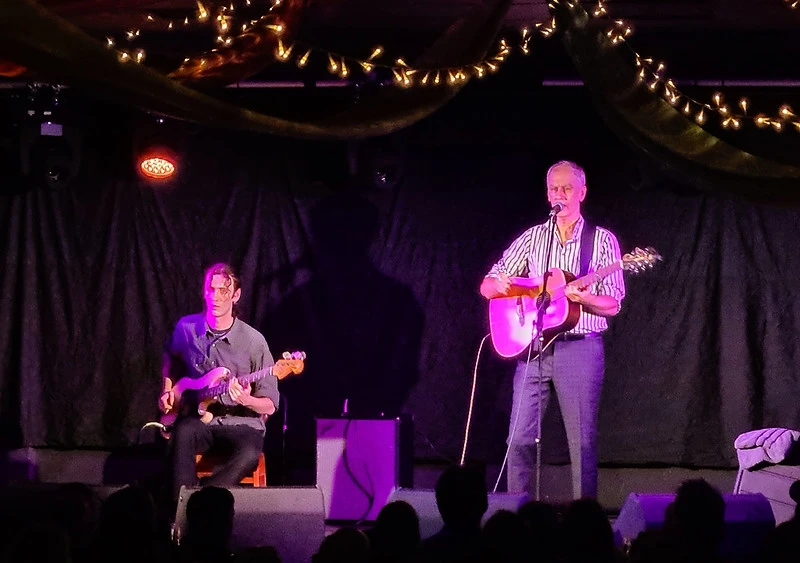
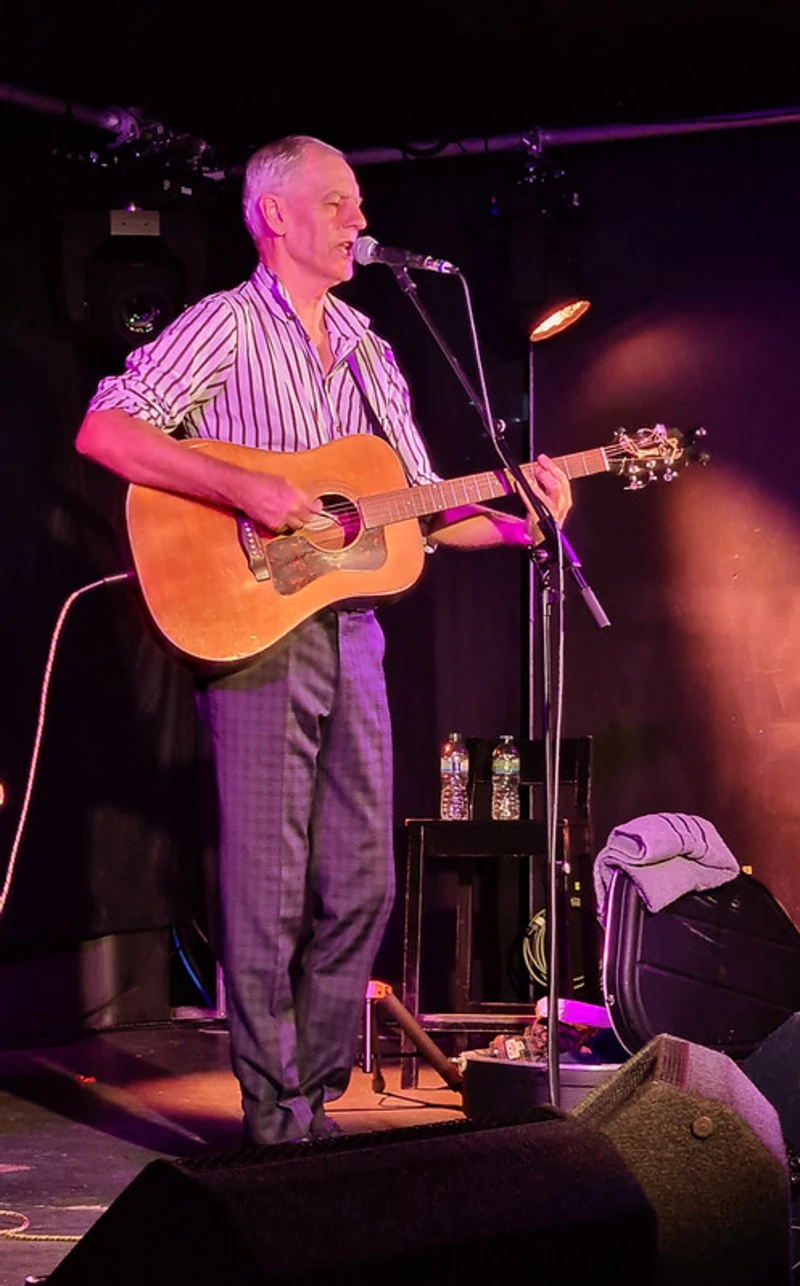
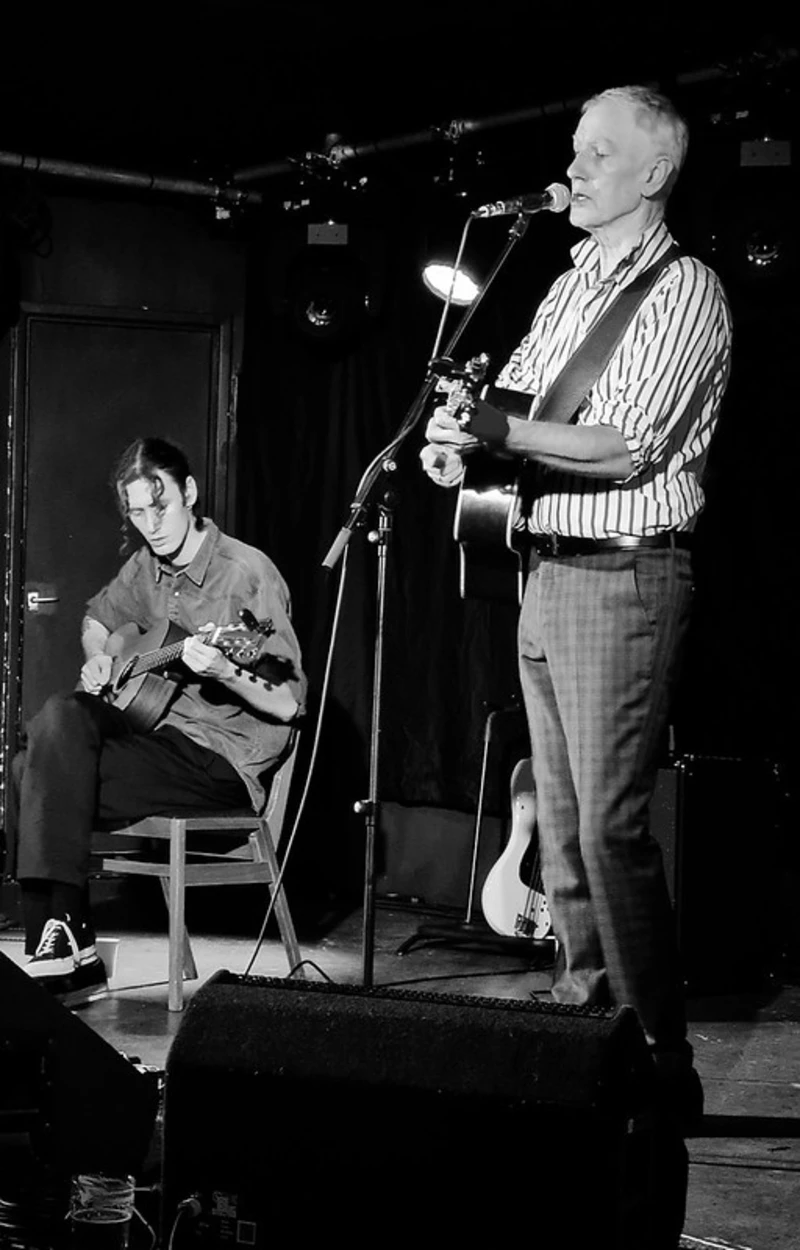
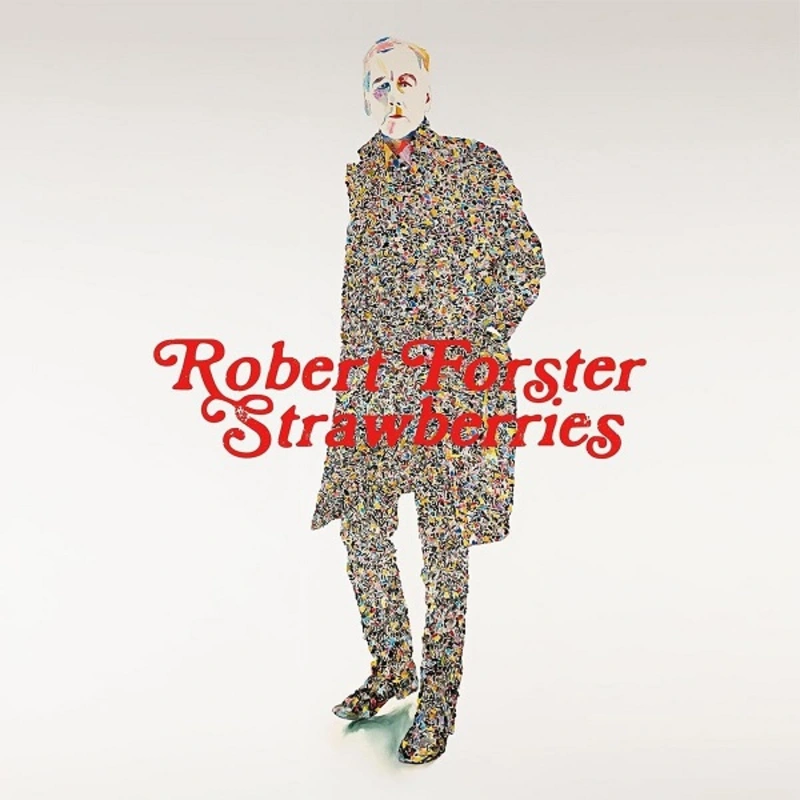
intro
Co-leader of cult Aussie indie rockers The Go-Betweens, Robert Forster chats to Denzil Watson about new solo LP ‘Strawberries’ and his upcoming October UK tour.
interviews |
|
Interview (2011) |
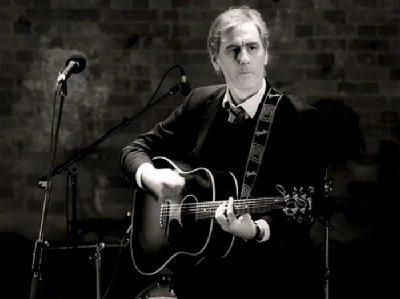
|
| Robert Forster from the Go-Betweens talks to Dixie Ernill about his debut book and collection of music writing ‘The 10 Rules of Rock ‘n’ Roll’, and his relationship with his late bandmate and songwriting partner, Grant McLennan |
features |
|
Ten Songs That Made Me Love... (2019) |
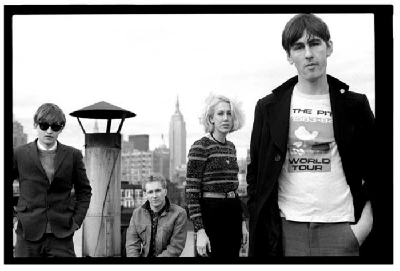
|
| Dixie Ernill, in 'Ten Songs That Made Me Love...', writes of his ten favourite songs by Australian singer-songwriter and Go Betweens co-founder Robert Forster. |
most viewed articles
current edition
Carl Ewens - David Bowie 1964 to 1982 On Track: Every Album, Every SongArmory Show - Interview with Richard Jobson
Colin Blunstone - Thalia Hall, Chicago, 16/7/2025
Visor Fest - Valencia, Spain, 26/9/2025...27/9/2025
John McKay - Interview
Bathers - Photoscapes 1
Robert Forster - Interview
Billie Eilish - O2 Arena, London, 10/7/2025
Loft - Interview
Sir Tim Rice - Interview
previous editions
Heavenly - P.U.N.K. Girl EPManic Street Preachers - (Gig of a Lifetime) Millennium Stadium, Cardiff, December 1999
Beautiful South - Ten Songs That Made Me Love...
Oasis - Oasis, Earl's Court, London, 1995
Trudie Myerscough-Harris - Interview
Prolapse - Interview
Pixies - Ten Songs That Made Me Love...
Coldplay - Wembley Arena. London, 16/8/2022
Boomtown Rats - Ten Songs That Made Me Love....
Peter Perrett - In Dreams Begin Responsibilities Interview Part One
most viewed reviews
current edition
Amy Macdonald - Is This What You've Been Waiting For?Sick Man of Europe - The Sick Man of Europe
Lucy Spraggan - Other Sides of the Moon
Davey Woodward - Mumbo in the Jumbo
Phew, Erika Kobayashi,, Dieter Moebius - Radium Girls
Alice Cooper - The Revenge of Alice Cooper
Bush - I Beat Loneliness
Blueboy - 2
Suzanne Vega - Flying With Angels
Cynthia Erivo - I Forgive You
Pennyblackmusic Regular Contributors
Adrian Janes
Amanda J. Window
Andrew Twambley
Anthony Dhanendran
Benjamin Howarth
Cila Warncke
Daniel Cressey
Darren Aston
Dastardly
Dave Goodwin
Denzil Watson
Dominic B. Simpson
Eoghan Lyng
Fiona Hutchings
Harry Sherriff
Helen Tipping
Jamie Rowland
John Clarkson
Julie Cruickshank
Kimberly Bright
Lisa Torem
Maarten Schiethart